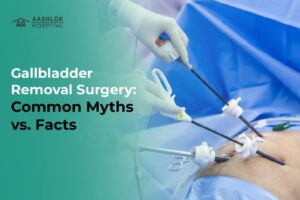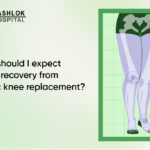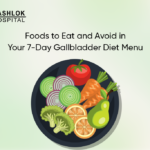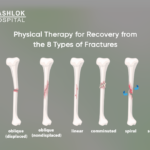Gallbladder Removal Surgery: Common Myths vs. Facts

Gallbladder removal surgery, also known as cholecystectomy, is a common procedure used to treat gallbladder issues such as gallstones or inflammation. Despite its prevalence, there are many misconceptions about this surgery that can cause confusion and anxiety for those considering or undergoing the procedure.
This article will clarify what gallbladder removal surgery entails, debunk some of the most common myths associated with it, and provide factual information to help patients make informed decisions about their health.
However, to get the best care and treatment for gallbladder surgery, visit Aashlok Hospital.
Read More : Comprehensive Guide to Gallstones Treatment: Understanding Your Options
What You Should Know About Gallbladder Removal?
Here is what you should be aware about if you have a gallbladder surgery soon:
Understanding Gallbladder Removal Surgery
Gallbladder removal surgery, or cholecystectomy, involves the surgical extraction of the gallbladder, a small organ located under the liver. The gallbladder’s primary function is to store bile, a digestive fluid produced by the liver. Bile helps in the digestion of fats. When the gallbladder becomes problematic due to conditions like gallstones or cholecystitis (inflammation), surgery may be recommended to alleviate symptoms and prevent complications.
The procedure can be performed using two main techniques: laparoscopic and open surgery. Laparoscopic cholecystectomy is the more common method, involving several small incisions and the use of a camera to guide the surgery. This technique generally results in quicker recovery times and less postoperative pain compared to open surgery, which involves a larger incision.
Recovery and Postoperative Care
After gallbladder removal surgery, patients typically stay in the hospital for a short period, usually 1 to 2 days, depending on the surgery type and individual recovery. Most people can resume normal activities within a few weeks. It is important to follow postoperative care instructions, including dietary adjustments and avoiding strenuous activities, to ensure a smooth recovery.
Patients may experience some digestive changes after surgery, such as changes in bowel habits or difficulty digesting fatty foods. These issues are usually temporary and can be managed with dietary modifications and gradual reintroduction of different foods.
Read More : 5 Safe Tips for Gallstone Prevention
Debunking Popular Myths About Gallbladder Removal Surgery
Here are some popular myths about gallbladder surgery and the actual truth about them:
Myth 1: Gallbladder Removal Surgery is Extremely Dangerous
Fact: Gallbladder removal is generally considered a safe procedure. With advancements in surgical techniques, especially laparoscopic methods, the risks associated with gallbladder removal have significantly decreased. Complications are rare but can include infection, bleeding, or injury to surrounding organs. Most patients experience a straightforward recovery and return to normal activities without major issues. You can reach out to Aashlok Hospital to get the safest treatment approaches under the medical guidance of renowned doctors, Dr. Alok Chopra, Dr. Ashwani Chopra, Dr. A K Singal, and Dr. Ajai Sharma.
Myth 2: You Can’t Eat Fatty Foods After Gallbladder Removal
Fact: While it’s true that some people may need to adjust their diet after gallbladder removal, it’s not accurate to say that all fatty foods must be completely avoided. The gallbladder’s absence may affect how your body digests fats, but most individuals can gradually reintroduce fatty foods into their diet without severe issues. It’s recommended to start with small amounts and observe how your body reacts, making dietary adjustments as needed.
Read More : 5 FOODS TO AVOID IN GALLSTONES
Myth 3: The Gallbladder is Essential for Digestion
Fact: The gallbladder’s primary role is to store and concentrate bile, but it is not essential for digestion. The liver continues to produce bile even after the gallbladder is removed. The body can adapt to the absence of the gallbladder, and bile will be released directly into the small intestine, where it still assists in the digestion of fats.
Myth 4: You Will Have Digestive Problems for the Rest of Your Life
Fact: Most people experience temporary digestive changes following gallbladder removal, but these are generally short-lived. Over time, many individuals find that their digestive system adjusts to the absence of the gallbladder, and they can return to a near-normal diet. Persistent digestive problems are uncommon and should be discussed with a healthcare provider if they occur.
Myth 5: Gallbladder Removal Leads to Long-Term Health Issues
Fact: Gallbladder removal is not typically associated with long-term health problems for the majority of patients. The surgery is designed to resolve issues like gallstones and inflammation, which can cause significant health concerns if left untreated. Any potential long-term effects are usually minor and manageable, especially when postoperative care instructions are followed.
Myth 6: You’ll Be Out of Work for a Long Time
Fact: Recovery time varies among individuals, but many people return to work within 1 to 2 weeks after laparoscopic surgery, depending on their job and overall health. Open surgery may require a longer recovery period. Following medical advice and gradually resuming activities can help speed up the return to normal routines.
Also Read : 7-Day Gallbladder Diet Menu: Benefits & Guide
Myth 7: Gallbladder Removal Causes Significant Weight Gain
Fact: There is no direct link between gallbladder removal and significant weight gain. Any weight changes are typically related to lifestyle and dietary adjustments rather than the surgery itself. Adopting a balanced diet and maintaining regular physical activity can help manage weight post-surgery.
Myth 8: Gallbladder Removal is Only Necessary for Older Adults
Fact: Gallbladder problems can affect individuals of any age, not just older adults. While gallbladder issues are more common with age, younger people can also experience gallbladder-related conditions that require surgical intervention. The need for surgery is based on the severity of symptoms and underlying conditions, not just age.
Myth 9: You Can’t Drive Immediately After Gallbladder Surgery
Fact: Most patients can resume driving within a few days to weeks after laparoscopic gallbladder surgery, depending on their comfort level and the specifics of their recovery. It’s essential to follow your doctor’s advice and ensure you are physically able to drive safely before getting back behind the wheel.
Read More : Gallstones- a stone to be removed from your body
Myth 10: The Surgery Will Lead to Increased Risk of Other Digestive Disorders
Fact: Gallbladder removal itself does not increase the risk of developing other digestive disorders. While some people may experience temporary digestive changes, such as diarrhea or bloating, these issues are usually manageable and not indicative of more severe problems. Regular follow-up with your healthcare provider can help address and manage any concerns.
Myth 11: You Will Have to Take Medication for Life After Surgery
Fact: Long-term medication is not typically required after gallbladder removal. Most patients do not need ongoing medication once they have fully recovered. Any short-term medications prescribed are usually for managing pain or preventing complications. Most individuals can manage their health with dietary adjustments and do not need lifelong medication.
Myth 12: Gallbladder Removal Leads to Nutrient Deficiencies
Fact: The removal of the gallbladder does not directly cause nutrient deficiencies. The body continues to digest nutrients effectively with bile produced by the liver. While some people might experience minor digestive changes, these are generally temporary and do not lead to significant deficiencies if a balanced diet is maintained.
Myth 13: Gallbladder Surgery Will Completely Cure All Digestive Issues
Fact: While gallbladder removal can effectively resolve issues related to gallstones and gallbladder inflammation, it may not address all digestive problems. Some patients might continue to experience digestive symptoms due to other underlying conditions. It’s important to follow up with a healthcare provider to manage any persistent issues or concerns.
Also Read : Exercise for Gall Bladder Stone: A Complete Guide for Pain Relief
Conclusion
Gallbladder removal surgery is a common and generally safe procedure that can significantly improve the quality of life for those suffering from gallbladder-related issues. Understanding the facts about the surgery and dispelling common myths can help alleviate concerns and prepare patients for a smoother recovery.
If you have any specific questions or concerns, visit Aashlok Hospital to get personalized information and guidance. For a completely tailored treatment plan for gallbladder surgery, reach out to our best medical professionals, Dr. Alok Chopra, Dr. Ashwani Chopra, Dr. A K Singal, and Dr. Ajai Sharma.
FAQs
Is gallbladder removal major surgery?
Gallbladder removal surgery is considered major but is typically safe, especially with laparoscopic techniques that minimize invasiveness.
How long does it take to recover from gallbladder surgery?
Recovery from gallbladder surgery usually takes about 1 to 2 weeks for laparoscopic procedures and longer for open surgery.
Can gallbladder removal cause problems later in life?
Long-term problems are rare, but some people may experience minor digestive changes that are usually manageable with diet adjustments.
Can I walk after gallbladder surgery?
Yes, most patients can walk soon after surgery, though it’s advisable to start with light activity and follow your doctor’s recommendations.










